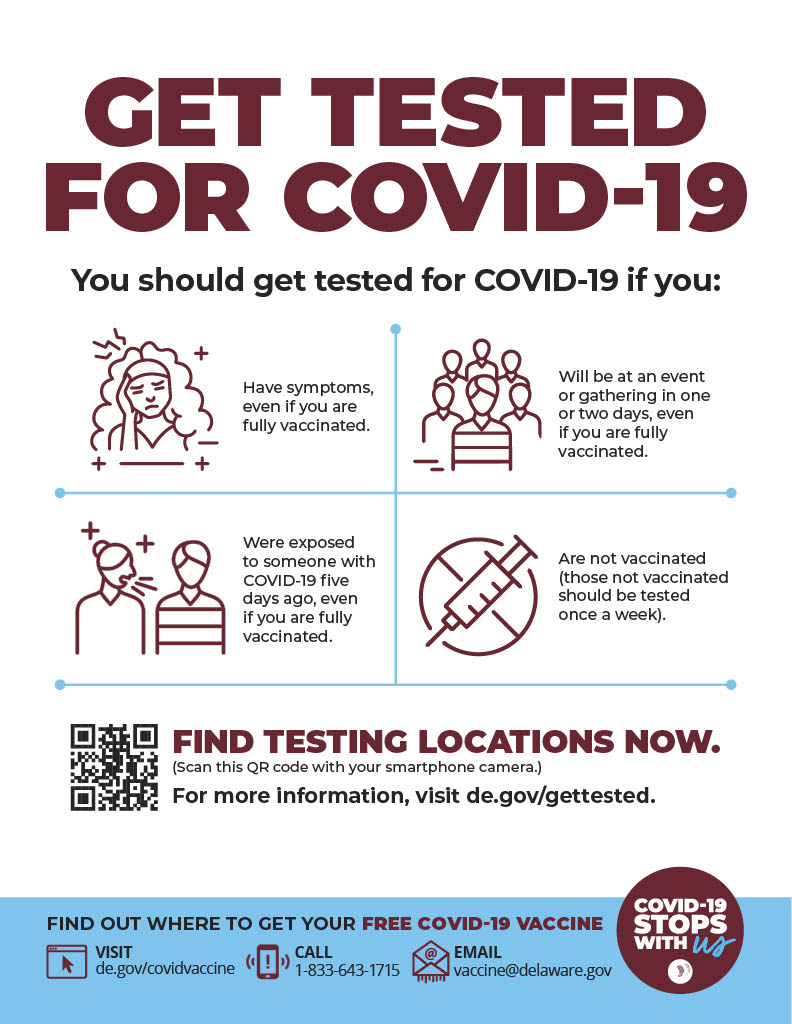Testing Information
Get tested. Find out when.
Testing can help reduce the spread of COVID-19 and keep you and your family safe. Get tested if you:
- Have symptoms even if you are fully vaccinated.
- Were exposed to someone with COVID-19 5 days ago, even if you are fully vaccinated.
- Will be at an event or gathering in 1-2 days, even if you are fully vaccinated.
- Are not vaccinated (those not vaccinated should be tested weekly).
- Find testing options, including at-home tests, at de.gov/gettested
- Symptoms
- Quarantine vs. Isolation
Testing Frequently Asked Questions
If you are sick with any of the following symptoms, stay home: fever, cough, shortness of breath, sore throat, muscle aches, fatigue, chills, shaking with chills, headache, nausea, vomiting or diarrhea, loss of smell or taste. Other symptoms such as abdominal pain or lack of appetite have been identified as potential symptoms related to COVID-19 and may prompt further screening, action or investigation by a medical provider.
Visit https://coronavirus.delaware.gov/testing/ to find a testing location near you, or order a home test kit.
The two general types of COVID-19 tests include an “active infection” test (PCR tests and antigen tests) to look for presence of the virus that causes COVID-19, or an “immune response” test (an antibody test) to look for evidence of previous infection.
PCR and antigen tests may use a deep nasal swab, a shallow nasal swab that swabs only at the front of the nostrils, or a throat swab. There are also PCR tests such as the LabCorp pixel test that can be performed by yourself at home. For many people, including those without health insurance, the test may come with no upfront cost. The test is a painless swab of the front of the nose that is mailed to LabCorp, and results are received electronically. More information is available here: https://www.pixel.labcorp.com/state-de.
Antibody tests can be performed with a finger stick or via a tube of blood drawn by a qualified healthcare provider. Antibody tests for COVID-19 are available through healthcare providers and laboratories. Check with your healthcare provider to see if they offer antibody tests and whether you should get one.
Symptoms
If you have a medical emergency, call 911 and make sure to let the dispatcher know which symptoms you are experiencing.
Things to know
If you are sick with any of the following symptoms, stay home:
- Fever
- Cough
- Shortness of breath
- Sore throat
- Muscle aches
- Fatigue
- Chills
- Shaking with chills
- Headache
- Nausea
- Vomiting
- Diarrhea
- Loss of smell or taste
Other symptoms such as abdominal pain or lack of appetite have been identified as potential symptoms related to COVID-19 and may prompt further screening, action or investigation by a medical provider.
Anyone experiencing symptoms should get tested for COVID-19 as soon as possible.
Quarantine vs. Isolation
What is the difference between “quarantine” and “isolation”?
Both quarantine and isolation help protect the public by preventing exposure to people who have or may have a contagious disease.
- Quarantine: separates and restricts the movement of people who were exposed to a contagious disease to wait and see if they are infected and become sick.
- Isolation: separates sick people with a contagious disease from people who are not sick.
Stats on COVID-19
For more data on Delaware COVID-19 cases including demographic breakdowns, go to My Healthy Community






